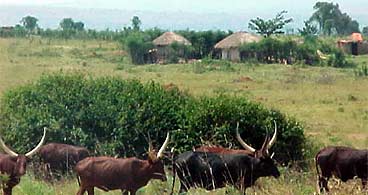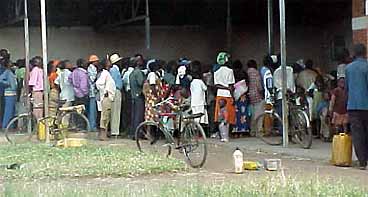The dilemma of forgiveness, distinguishing massacres from genocide, victor's justice
Someone told me last week that the foundation of the gacaca courts lies in Rwandan culture, that in this culture there exists a moral obligation to forgive others for crimes suffered, and that it is upon that basis, and only upon that basis, that the courts will be able to function, will be able to fulfill their reconciliatory purpose. A few nights later, someone else exclaimed, "forgiveness is not possible in Rwanda! How can anybody who has had 30 members of their family killed possibly be expected to forgive their killer? How is that possible? It is not! Forgiveness and reconciliation is not a reality here. People must go on with their lives, they have no choice. But forgiveness? Not here, not in my lifetime!"
Everyday here in Rwanda, I must navigate within these contradictions. It would be simplistic to say that everything here has two explanations, and yet it seems that may be the case. It is not only the future of this country that is a hotly contested topic, but Rwanda's history and past is equally, if not even more hotly, contested.
This last week I traveled with Internews to Umutara, a large and primarily rural province in northeastern Rwanda. It is known as the cattle-raising region of Rwanda, and as we drove through the region, screening documentary films on the gacaca system and films on other judicial issues in Rwanda, we passed herd upon herd of the long-horned cattle that stroll through valleys and across fields and roads. These herds usually are accompanied by a young boy. Groups of these boys gather with their herds at lakes and waterholes around the countryside.
 A typical roadside scene in Umutara |
In comparison to the other regions of Rwanda that I've seen so far, the first thing I noticed about many parts of Umutara was its relatively sparse population, at least in comparison to many other parts of this densely populated country. About halfway through the week, I discovered the reason for this. Someone explained to me that Umutara province is actually a new province. It was created after the war, with four of its districts borrowed from the neighboring province of Byumba and the other four carved out of Akagera National Park, the park that now lies on the eastern border of Umutara and that forms the border with Tanzania. The province, and particularly the four "new" districts, was created as a way to accommodate Rwandan refugees returning home after the war, who were granted land in this new region in order to allow them to resettle in Rwanda.
This province also has an additional twist to its history. During the months and years that preceded the 1994 genocide, many areas of this region were occupied by the Rwandan Patriotic Army (RPA), the army that would eventually take control of the country and bring an end to the genocide. Due to this occupation, the incidents of genocide in many districts of this province were remarkably few, yet Umutara was nonetheless the site of many other heinous massacres. The history of this latter category of massacres is one of the many hotly contested pieces of Rwandan history, and one that is particularly relevant to the implementation of gacaca courts in this country.
The gacaca courts have been set up to try only crimes of genocide. This limited jurisdiction does not allow them to try the perpetrators of the other massacres that occurred during this time, many of whom are alleged to have been members of the RPA. Although the government maintains that these alleged war criminals will be tried by other courts, this distinction between massacres that constitute genocide and those that do not is a recurring question that comes up after film screenings on gacaca in small villages.
Although the distinction between the two might be obvious to legal scholars, it is not so obvious to many people in rural Rwanda, many of whom see this choice to limit the gacaca courts' jurisdiction as an unfair demonstration of what is often referred to as 'victor's justice.' This is a major concern regarding the gacaca system, one that has been voiced by various international human rights organizations. So it was with all of this in mind - the political and legal context and the regional history of Umutara - that I observed people's responses to the film screenings this last week.
Altogether, my experience in Umutara serve as a reminder: in order to truly understand the context in which I am working here, I must grasp not only the history of the Rwanda, but the history of each individual region, if not each individual village.
— Radha



